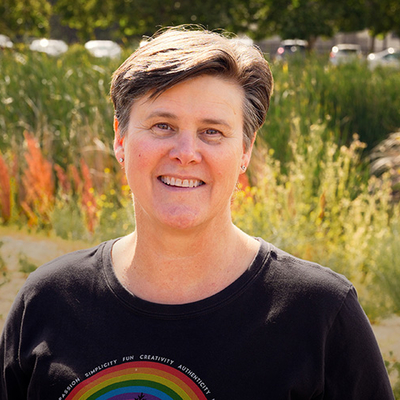Julie Klein

“I think we all have work to do – every one of us,” Klein said. “We can all get better in some way or another at making ourselves and the Lab more accepting. More welcoming. More inclusive.”
In her nearly 40 years at Lawrence Livermore National Laboratory (LLNL), Julie Klein has seen a lot of change in the world through the Lab’s lens.
Currently the program lead for the Computing organization’s Information Technology (IT) Solutions division and LivIT Workforce Enablement program, Klein is now preparing for retirement in a time when the LGBTQ+ community is yet again under the microscope nationally, and is grateful to look back at her career and the Lab as a place where she has been lucky enough to be herself.
Born and raised in Livermore to two Lab employees, Klein carried on the family tradition when she was hired as a contractor shortly after high school and later supported the Atomic Vapor Laser Isotope Separation (AVLIS) program as a full-time employee. Klein’s interest and experience landed her in the IT field where she learned on the job and in part-time coursework at Las Positas Community College before completing her bachelor’s degree in leadership and organizational development at St. Mary’s College.
Having basically grown up at the Lab, Klein has lived through many cultural changes both onsite and in the world, none of it taking place overnight. While she thinks the Lab is moving in a good direction on matters of diversity and inclusion, she thinks there’s still a lot of work to do. Klein said she hopes to see every person at the Lab put in the effort to embrace diversity, equity and inclusion — not just by saying the words, but by being intentional with actions and owning the outcome.
“I think we all have work to do – every one of us,” Klein said. “We can all get better in some way or another at making ourselves and the Lab more accepting. More welcoming. More inclusive.”
Klein said this notion doesn’t apply only to LGBTQ+ but to diversity in general, and that everyone benefits from diverse thoughts and people that can bring different ideas and frames of reference into a conversation or to solving a problem. She said that as a scientific institution, the Lab is only made better by pushing for greater diversity.
“The Lab is a microcosm of the country and the world, so if we want to solve problems on those levels, we should work to mirror and embrace the diversity we see beyond our own gates,” she said.
A longtime member of the Livermore Pride employee resource group (ERG), Klein is now transitioning to an advisory role as she prepares for retirement. Klein said ERGs are critical to creating a sense of community, especially for folks who may be newer and looking to find their place at the Lab. However, Klein argues that joining an ERG or attending a Livermore Pride event shouldn’t be solely for those who are already allies or LGBTQ+ themselves.
“ERGs are a great resource for employees who desire to be educated,” Klein said. “If you’ve never been in a situation where you felt you had to hide a part of who you are just to come to work every day, it’s hard to understand. Making connections at ERG events are a great way to gain some perspective.”
Klein has had to work through uncomfortable situations and with insensitive coworkers in the past.
“I can remember times where I didn’t feel I could bring my entire self to work, to my life outside work, because I felt pressure to blend in, to be ‘normal’,” Klein said. “Over time that feeling grew, and I began to feel I had to be perfect, could never measure up and wasn’t good enough. I compensated for that with a tough exterior, joking to deflect and pushing back when necessary for self-preservation. In some ways I feel I was lucky in my work life. Early in my career, I had a very open boss who accepted me and saw my potential. She provided a bit of safety at work that eventually helped me feel more comfortable in my own skin.”
Klein said it is this kind of unquestioning acceptance in the workplace that encourages people to be the most authentic versions of themselves when they’re on site. Encouraged by how empathetic and accepting folks are now compared to what she occasionally saw and encountered at work in the past, Klein said feeling out of place for who you are is something everyone has experienced but most don’t always see the parallels.
“It’s like the feeling you get as a kid in class when you have an answer, but you don’t raise your hand because you are afraid of being wrong,” Klein said. “Imagine that feeling every day: from the time you get dressed in the morning, to leaving your home, arriving at work where your peers are talking about their families and then into your interactions all day at work. Imagine having that same situation with friends and family outside of work — fearing that just being yourself will be wrong. I think if we could get people to really understand this, things could be a lot better.”
From navigating who among her family, friends and coworkers she could be herself with, to witnessing times of overt hate from the world toward her community and even with the tension felt by LGBTQ+ folks today, Klein reflects on her own journey and progress made.
“I have a lot of friends and family and there isn’t really anyone I am not ‘out’ with anymore,” Klein said. “It’s pretty cool to be able to say ‘here I am. Take me or leave me but I’m not going to be anybody but who I am.’”




